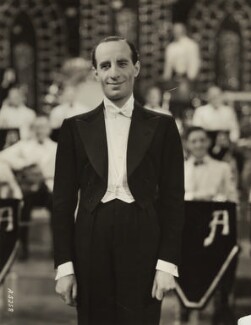Related Research Articles

BBC Radio 1 is a British national radio station owned and operated by the BBC. It specialises in modern popular music and current chart hits throughout the day. The station provides alternative genres at night, including electronica, dance, hip hop and indie, while its sister station 1Xtra plays black contemporary music, including hip hop and R&B. Radio 1 also runs two online streams, Radio 1 Dance, dedicated to dance music, and Radio 1 Relax, dedicated to chill-out music; both are available to listen only on BBC Sounds.

Sunday is the day of the week between Saturday and Monday. In most Western countries, Sunday is a day of rest and a part of the weekend. It is often considered the first day of the week.

The BBC Light Programme was a national radio station which broadcast chiefly mainstream light entertainment and light music from 1945 until 1967, when it was replaced by BBC Radio 2 and BBC Radio 1. It opened on 29 July 1945, taking over the long wave frequency which had earlier been used – prior to the outbreak of the Second World War on 1 September 1939 – by the National Programme.
Alan Dell, born Alan Creighton Mandell, was a BBC radio broadcaster, associated in particular with dance band music of the 1920s, 1930s and early 1940s.
Clare Teal is an English singer and broadcaster who has become famous not only for her singing, but also for having signed the biggest recording contract by a British jazz singer.

Annie Mac, is an Irish DJ, broadcaster and writer. She hosted a variety of shows on BBC Radio 1, including BBC Switch and Future Sounds. She also DJed in various locations, including hosting her AMP Lost and Found venues in places like Ibiza.

Benjamin Baruch Ambrose, known professionally as Ambrose or Bert Ambrose, was an English bandleader and violinist. Ambrose became the leader of a highly acclaimed British dance band, Bert Ambrose & His Orchestra, in the 1930s.

The Hitman and Her was a British television dance music programme hosted by Pete Waterman and Michaela Strachan. The programme was produced for Granada Television and ran from September 1988 until December 1992 on ITV's Night Network.
Friday Night is Music Night is a long-running live BBC radio concert programme featuring the BBC Concert Orchestra, broadcast on the BBC Light Programme and its successor BBC Radio 2 since 1953. The programme is the world's longest-running live orchestral music radio programme.

The BBC Big Band, originally known as the BBC Radio Big Band is a British big band, previously run under the auspices of the British Broadcasting Corporation (BBC). The band broadcasts exclusively on BBC Radio, particularly on BBC Radio 2's long-running series Big Band Special. It consists of professional musicians and is directed by a number of conductors. These include arranger and composer Barry Forgie, who has been the band's Musical Director since 1977, American jazz trombonist Jiggs Whigham, and guest musical directors.

Samuel Gabriel Costa was an English singer, entertainer and broadcaster. Initially a popular singer in the dance band era and a comic actor on the show Much-Binding-in-the-Marsh, he was later a disc jockey for Radio Luxembourg and the BBC.
BBC Radio Manchester is the BBC's local radio station serving Greater Manchester.

British dance band is a genre of popular jazz and dance music that developed in British dance halls and hotel ballrooms during the 1920s and 1930s, often called a Golden Age of British music, prior to the Second World War.
Malcolm Richard Laycock was an English radio presenter who hosted jazz, big band, and dance band programmes for BBC Radio 2 and the BBC World Service.
Big Band Special was a BBC Radio 2 series which launched in September 1979, as a showcase for the BBC Big Band in session and in concert. Big Band Special was a 30-minute programme broadcast on Monday nights at 9.30pm and presented by Clare Teal since April 2006. Big Band Special was also available to listen to for a further seven days following each broadcast via the BBC iPlayer.
Sunday Night At 10, also known as The Age of Swing, was a weekly hour long programme on BBC Radio 2 in the United Kingdom. Aired on Sunday evenings at 10pm, it featured big band music from the late 1930s and early 1940s through to the present day. Presented by jazz singer Clare Teal it regularly drew a weekly listening audience of 360,000. The programme was subsumed into a two-hour show after its content was merged with that of Big Band Special in September 2013.
This is a list of events in British radio during 2009.

BBC Radio 2 is a British national radio station owned and operated by the BBC. It is the most popular station in the United Kingdom with over 15 million weekly listeners. Since launching in 1967, the station broadcasts a wide range of content. The Radio 2 about page says: "With a repertoire covering more than 40 years, Radio 2 plays the widest selection of music on the radio—from classic and mainstream pop to a specialist portfolio including classical, country, folk, jazz, soul, rock 'n' roll, gospel and blues."

Callender's Cableworks Band was an amateur brass band made up of members employed by and under the patronage of Erith Works at the Callender Cable & Construction Co. Ltd, later British Insulated Callender's Cables, in Belvedere, Kent, and performing in London and south-east England. They were prolific broadcasters in the early years of BBC Radio, and won 25 brass band competitions.
A timeline of notable events relating to BBC Radio 2, a British national radio station which began broadcasting in September 1967.
References
- 1 2 Wright, John. "Dance bands on Radio 2" . Retrieved 17 August 2009.
- ↑ "About". Dance Band Days. 17 November 2015. Retrieved 14 March 2019.